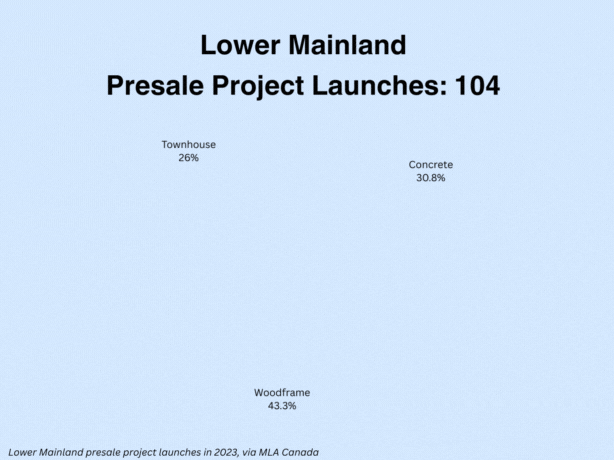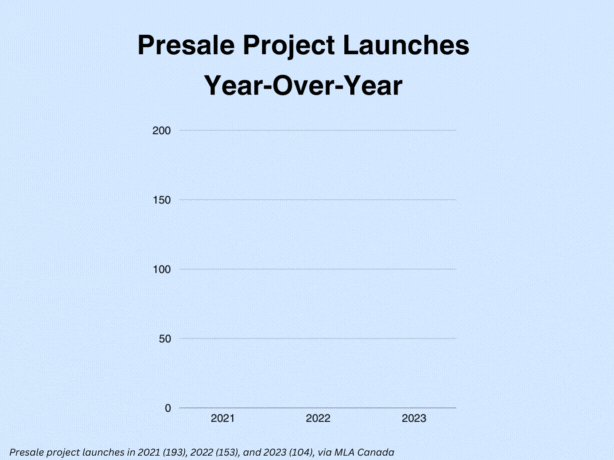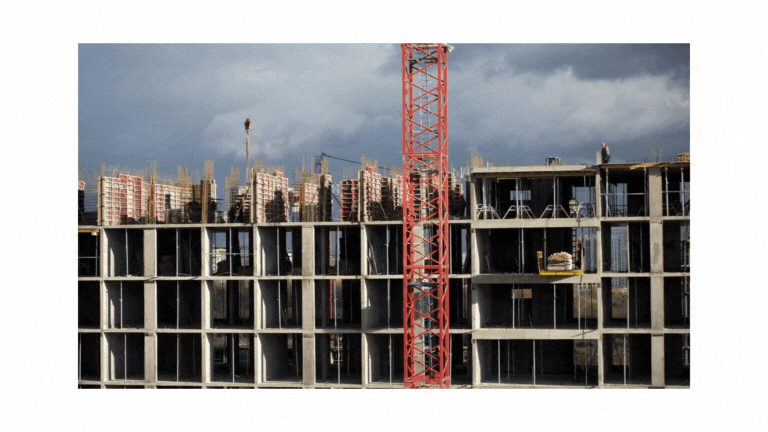The year of 2023 saw many changes, and yet, many things also stayed the same. All three levels of government made big commitments on the housing front, but most of the actions they have taken will need more time to bear fruit. Meanwhile, the cold market realities of 2022 largely carried over into 2023, with labour, materials, and interest rates all remaining high.
As a result of this, "project sales velocity and revenues remain relatively flat," says Vancouver-based real estate marketing and advisory firm MLA Canada, in their 2024 Intel report.
After projecting 95 project launches in their 2023 Intel report, the Lower Mainland surprised on the upside and saw a total of 104 presale project launches in 2023, split between 32 concrete projects, 45 woodframe projects, and 27 townhouse projects.
Although this number of launches was the lowest total since 2011 — which also saw 104 — the amount of units launched was fairly healthy, at 13,049. That total was 20% below the 10-year average, and places 2023 above the pre-and early-pandemic years — 9,600 in 2019 and 9,970 in 2020 — but below the late-pandemic years — 21,090 in 2021 and 16,060 in 2022.
There were some "stark differences" across submarkets too, as a result of the diversity in project offerings and price points. Most notably, West Coquitlam and Burnaby emerged as hotspots for presale activity, seeing persistent demand and solid absorptions throughout the year.
READ: Burnaby's Metrotown Takes Centre Stage In The Pre-Sale Condo World
At the other (higher) end of the spectrum, Vancouver's westside and downtown saw a reduced competitive environment, save for a few projects located in the Cambie Corridor near Queen Elizabeth Park.
During 2023, end pricepoints largely drove project success. In subdued markets such as 2023, savvy investors focus their attention on projects that have the right blend of value and offering. In Greater Vancouver this was seen in larger, concrete developments, and in the Fraser Valley, it was within lowrise, woodframe developments. Lowrise projects offer relatively attainable prices and more predictable completion timelines compared to larger, more comprehensive developments.
"The presale metrics from 2023 present a subdued picture, contrasting sharply with the vibrant activity witnessed in 2021 and the beginning of 2022," says MLA Canada. "2023 concluded with a just over 100 new project launches in the Lower Mainland, a figure reflective of the market's cautious stance amidst prevailing conditions."
These prevailing conditions are "projecting a shadow" that's likely to extend into 2024 — and perhaps beyond — and developers will need to be resilient and adaptable to find success, says MLA Canada.
But it's not all doom and gloom — there are some glimpses of hope on the horizon. Presale purchases remain a strategic hedge against inflation, serving as a buffer against the immediate effects of elevated interest rates, and the subdued activity of the last ~18 months has created pent-up demand for housing.
MLA Canada notes that the rental market is continuing to expand, rapidly, as the population of renters in Canada continues to grow in response to increased challenges regarding ownership. Rental starts have increased six-fold over the past decade, but a survey of developers conducted by MLA Canada found that 94% of developers still believe escalating building costs are having a "significant" impact on their business — undoubtedly felt by rental projects as well.
Between the federal government's elimination of GST for rental construction, the Province's Housing Supply Act, changes to the BC Building Code, and Metro Vancouver's increases to development cost charges (DCCs), the change that developers anticipate to have the biggest impact — negatively, in this case — will be the DCC increases, although those increases are not coming into effect this year.
"As we look toward 2024, tightened access to capital and lending markets is expected to be a major obstacle for development,” says MLA Canada. "Increased costs, particularly in terms of materials, labour, and borrowing, are set to make hurdle rates increasingly difficult for developers to achieve. Developers that are well capitalized and have access to long-term land holds will continue to have the leg up on those who do not."
MLA Canada's 2024 Intel report is launching soon. To receive it in your inbox on the day of its release, and to subscribe to MLA Canada Newswire, click here.
______________________________________________________________________________________________________________________________
This article was produced in partnership with STOREYS Custom Studio.
























